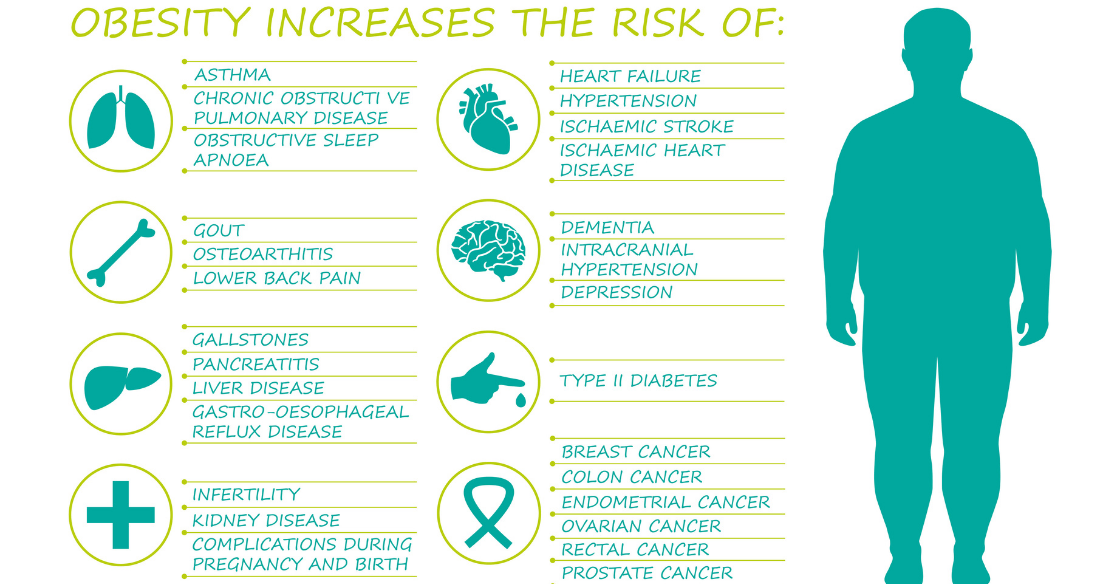Obesity is a complicated issue that can stem from genetics, behavior, and environmental factors such as geographic location and income level. Because there are so many circumstances that can cause obesity, it’s important to understand why you or a loved one is struggling with excess weight so you can work toward a healthier future. Whether that means altering your diet and exercise or undergoing weight-loss surgery, the cost of obesity is too high to go without finding a solution.
This cost can be associated with health and economic impacts that disrupt a person’s quality of life. Preventing obesity is the first step in reducing its overall toll on communities around the world. However, prevention can only occur when education and resources are given to vulnerable communities. Let’s start by reviewing the cost of obesity to physical and mental health.
Health Effects of Obesity
Obesity takes a toll on health and well-being in more ways than one. The health costs of obesity can include low quality of life, mental illness, body pain, and difficulty with physical functioning. More severe complications include:
- Premature death
- High blood pressure
- High LDL cholesterol, low HDL cholesterol, or high levels of triglycerides
- Type 2 diabetes
- Coronary heart disease
- Stroke
- Gallbladder disease
- Osteoarthritis
- Sleep apnea and breathing problems
- Certain types of cancer
Taking steps to overcome obesity will help reduce your risk of developing these conditions and reduce the strength it takes to fight them. The cost of obesity to your health is high, but it is possible to reduce that cost with proper medical attention and commitment. Talk to your doctor about surgical and non-surgical medical solutions for weight-loss.

Economic Cost of Obesity
The health effects of obesity can be detrimental, but they can also place an economic burden on those suffering from unmanageable weight-gain. Health problems that stem from or cause obesity increase medical care costs and time spent away from work. A study by the McKinsey Global Institute, a firm focused on reporting global economic trends and developments, found that the worldwide cost of obesity has topped $2 trillion. Put into a different context, that’s enough to buy every major American sports league — the NFL, the NBA, the NHL, and NASCAR, plus every Major League Baseball team — and still have three-quarters of the money left to spend.
The McKinsey report further explained that “2.1 billion people — about 30 percent of the global population— are overweight or obese”. It went on to say that about “15 percent of health care costs in developed economies are driven by it.”
What’s more, as countries continue to develop and gain resources, including currency, those countries also experience a sharp increase in their total rate of obesity. More and more developing nations are now in competition with the current leaders in obesity rates — the United States, China, and India.
If this trend continues, nearly 50% of the world’s adult population will be battling obesity in just 15 years. That’s certainly a foreboding statistic, but from a personal perspective, the CDC also found that annual medical costs were $1,429 higher for American adults with a BMI of 26 or higher.
Direct and indirect costs of obesity
The economic costs associated with obesity are categorized in two ways; direct and indirect.
Direct costs of obesity stem from health-related services such as surgery, lab testing and scans, and therapy. We can even categorize the cost of weight-loss surgery with these fees. However, it may save you money on health services down the road.
Indirect costs are the resources lost as a result of health circumstances. Officials often overlook these costs, putting those suffering from obesity at an undefinable disadvantage. Indirect costs of obesity can result from:
- Missed work: Employees battling obesity miss more days from work due to short-term absences, long-term disability, and permanent medical leave. The cost is both in the value of missed payment opportunities and the value of unfinished work.
- Insurance Inequalities: Obese individuals are given higher life insurance premiums and risk termination of health care plans.
- Lower Wages: Studies have shown that obesity is associated with lower salaries and, often, low-income households. Low-income communities are also more likely to lack affordable healthy food and health care options, making it even more challenging to achieve weight-loss goals.

Overcoming Obesity
Despite ineffective prevention tactics, global and political awareness that leaders in communities, governments, and international organizations need to do more is finally rising. The economic burden and consequences of excess weight on individuals’ health and state-of-mind are becoming too great for world-leaders to ignore. In the meantime, there are still options to improve your health. If you or a loved one is suffering from obesity, talk with a specialist about the weight-loss resources available at Olde Del Mar Surgical. Weight-loss can be daunting, but you don’t have to do it alone. Contact Olde Del Mar Surgical today!
You May Also Like